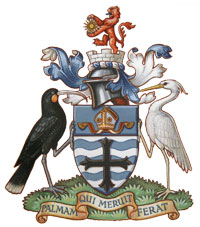Related Research Articles

Motueka is a town in the South Island of New Zealand, close to the mouth of the Motueka River on the western shore of Tasman Bay. It is the second largest in the Tasman Region, with a population of 8,320 as of June 2023.

Charles Elliott was a New Zealand politician and newspaper proprietor.

Nelson is a New Zealand parliamentary electorate, returning one Member of Parliament to the House of Representatives of New Zealand. From 1853 to 1860, the electorate was called Town of Nelson. From 1860 to 1881, it was City of Nelson. The electorate is the only one that has continuously existed since the 1st Parliament in 1853.

James Crowe Richmond was a New Zealand politician, engineer, and an early painter in watercolours of the New Zealand landscape.
Lyttelton is a former New Zealand parliamentary electorate. It existed from 1853 to 1890, and again from 1893 to 1996, when it was replaced by the Banks Peninsula electorate.
City of Dunedin, during the first two parliaments called Town of Dunedin, was a parliamentary electorate in Dunedin in Otago, New Zealand. It was one of the original electorates created in 1853 and existed, with two breaks, until 1905. The first break, from 1862 to 1866, was caused by an influx of people through the Otago Gold Rush, when many new electorates were formed in Otago. The second break occurred from 1881 to 1890. It was the only New Zealand electorate that was created as a single-member, two-member and three member electorate.
The Suburbs of Nelson is a former parliamentary electorate around the city of Nelson, New Zealand from 1861 to 1881.
The 3rd New Zealand Parliament was a term of the Parliament of New Zealand. Elections for this term were held between 12 December 1860 and 28 March 1861 in 43 electorates to elect 53 MPs. Two electorates were added to this during this term, Gold Fields District and a new Dunedin electorate created by splitting the existing City of Dunedin into Dunedin and Suburbs North and Dunedin and Suburbs South, increasing the number of MPs to 57. During the term of this Parliament, six Ministries were in power.

Richmond Hursthouse was a 19th-century Member of Parliament in Nelson, New Zealand, and a cabinet minister.

Andrew James Richmond was a 19th-century Member of Parliament in Golden Bay / Mohua and Nelson, New Zealand.

John Fedor Augustus Kelling, JP, known as Fedor Kelling, was a 19th-century Member of the New Zealand Parliament, representing Nelson. A leader of a group of immigrants from Germany, he also served as the German consul.

Arthur Shuckburgh Collins, later spelling his surname Collyns, was a 19th-century Member of Parliament from Nelson, New Zealand.

Martin Lightband was a 19th-century Member of Parliament from Nelson, New Zealand.
William Gibbs was a 19th-century Member of Parliament from the Nelson Region of New Zealand.

The mayor of Nelson is the head of the municipal government of Nelson, New Zealand, and presides over the Nelson City Council. The mayor is directly elected using a single transferable vote electoral system. The current mayor is Nick Smith, who was elected in September 2022.
The New Zealand Constitution Act 1852 authorised the General Assembly to establish new electoral districts and to alter the boundaries of, or abolish, existing districts whenever this was deemed necessary. The rapid growth of New Zealand's European population in the early years of representative government meant changes to electoral districts were implemented frequently, both at general elections, and on four occasions as supplementary elections within the lifetime of a parliament.
Henry Redwood was a New Zealand farmer, politician and racehorse breeder.
The 1868 Collingwood by-election was a by-election held on 18 March 1868 in the Collingwood electorate during the 4th New Zealand Parliament.

The mayor of Richmond was the head of the municipal government of Richmond, New Zealand. The position existed from 1891, when the Borough of Richmond was formed, until the borough was amalgamated into Tasman District in the 1989 local government reforms.
References
- ↑ "Latest telegrams". West Coast Times. No. 2376. 14 May 1863. p. 2. Retrieved 12 January 2020.
- ↑ "Suburban Election". Nelson Evening Mail . Vol. VIII, no. 111. 9 May 1863. p. 2. Retrieved 12 January 2020.
- ↑ "Suburbs election". Nelson Evening Mail . Vol. VIII, no. 115. 14 May 1863. Retrieved 12 January 2020.